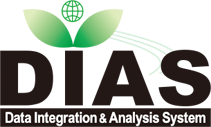


  |  |
| Name | 5-km resolution ensemble climate data around Hokkaido (heavy rainfall event) |
| DOI | doi:10.20783/DIAS.647 |
| Metadata Identifier | d4PDF_5kmDDS_Hokkaido20230727103748-DIAS20221121113753-en |
| Name | Tomohito Yamada |
|---|---|
| Organization | Hokkaido University |
| namimati_dias@eng.hokudai.ac.jp |
| Name | DIAS Office |
|---|---|
| Organization | Japan Agency for Marine-Earth Science and Technology |
| Address | 3173-25, Showa-Cho, Kanazawa-ku, Yokohama-shi, Kanagawa, 236-0001, Japan |
| dias-office@diasjp.net |
| Name | Tomohito Yamada |
|---|---|
| Organization | Hokkaido University |
| Name | Tomohito Yamada |
|---|---|
| Organization | Hokkaido University |
creation : 2021-03-31
The dataset contains annual maximum rainfall events at 5 km resolution created using dynamic downscaling of d4PDF 20 km regional experiments. The target event of the dynamical downscaling is set as maximum 72 hours rainfall event between June 1st to November 30th over the catchement area of the Obihiro reference point in Tokachi River. The target domain for downscaling was the area around Hokkaido (some islands were not included). The dynamical downscaling covered three scenarios: historical climate experiment (60 years x 50 ensemble members from 1951 to 2010), +2K future climate experiment (60 years x 9 ensemble members x 6 SST patterns), and +4K future climate experiment (60 years x 15 ensemble members x 6 SST patterns). This dataset contains several thousand years of heavy rainfall at 5km resolution. It is expected to be used for various applications such as statistical evaluation of heavy rainfall, flood risk assessment, and adaptation measures.
climatologyMeteorologyAtmosphere
| Begin Date | 1951-06-01 |
| End Date | 2010-11-30 |
| Temporal Characteristics | 30minute |
| North bound latitude | 47 |
| West bound longitude | 137 |
| Eastbound longitude | 148 |
| South bound latitude | 38.5 |
| Dimension Name | Dimension Size (slice number of the dimension) | Resolution Unit |
|---|---|---|
| row | 221 | 5 (km) |
| column | 171 | 5 (km) |
| time | 719 | 30 (minute) |
| Keyword Type | Keyword | Keyword thesaurus Name |
|---|---|---|
| theme | Atmosphere > Precipitation > Precipitation Amount, Atmosphere > Atmospheric Temperature > Air Temperature, Atmosphere > Atmospheric Winds > Surface Winds > Wind Speed/Wind Direction, Atmosphere > Atmospheric Water Vapor > Water Vapor | GCMD_science |
| Keyword Type | Keyword | Keyword thesaurus Name |
|---|---|---|
| theme | DIAS > Data Integration and Analysis System | No_Dictionary |
file download : https://data.diasjp.net/dl/storages/filelist/dataset:647
1. Before using the data, submit an application for use and obtain permission from the dataset creator.
2. The data shall be used only for research and educational purposes as stated in the application for use, and shall not be used for profit or any other purpose.
3. The name, affiliation, and contact information of the person responsible for using the data, as well as the purpose of use, must be made clear.
4. Users are not permitted to alter the contents of this data.
5. Users are not permitted to provide this data to any third party.
6. If you have made a presentation at a conference, published an article, published a journal article, or made a report using this data, submit a copy of the publication (a reprint in the case of an article, or a copy of the abstract in the case of an oral or poster presentation) to the DIAS office. For mailing address, etc., contact the DIAS office.
7. Cooperate with inquiries from data providers concerning the contents of deliverables using this data (materials submitted in accordance with 6. above).
8. If you are requested to publish data created using this dataset when submitting a paper, etc., contact the dataset creator and ask for permission to publish the data.
If data provider does not have data policy, DIAS Terms of Service (https://diasjp.net/en/terms/) and DIAS Privacy Policy (https://diasjp.net/en/privacy/) apply.
If there is a conflict between DIAS Terms of Service and data provider's policy, the data provider's policy shall prevail.
This research is supported by the Social Implementation of Climate change Adaptation Technology (SICAT) and the Integrated Research Program for Advancing Climate Models (TOUGOU) from the Ministry of Education, Culture, Sports, Science and Technology (MEXT). The Earth simulator was used in this study for dynamical downscaling under the “Proposed research project” and “Strategic Project with Special Support” of the Japan Agency for Marine-Earth Science and Technology (JAMSTEC).
If you plan to use this dataset for a conference presentation, paper, journal article, or report etc., please include acknowledgments referred to following examples. If the data provider describes examples of acknowledgments, include them as well.
" In this study, [Name of Dataset] provided by [Name of Data Provider] was utilized. This dataset was also collected and provided under the Data Integration and Analysis System (DIAS), which was developed and operated by a project supported by the Ministry of Education, Culture, Sports, Science and Technology. "
Yamada, T.J., Hoshino, T., Masuya, S., Uemura, F., Yoshida, T., Omura, N., Yamamoto, T., Chiba, M., Tomura, S., Tokioka, S., Sasaki, H., Hamada, Y., Nakatsugawa, M., 2018. The Influence of Climate Change on Flood Risk in Hokkaido. Advances in River Engineering. 24, 391-396.
Hoshino, T., Yamada, T.J., Kawase, H., 2020. Evaluation for Characteristics of Tropical Cyclone Induced Heavy Rainfall over the Sub-basins in The Central Hokkaido, Northern Japan by 5-km Large Ensemble Experiments. Atmosphere (Basel). 11, 1–11.